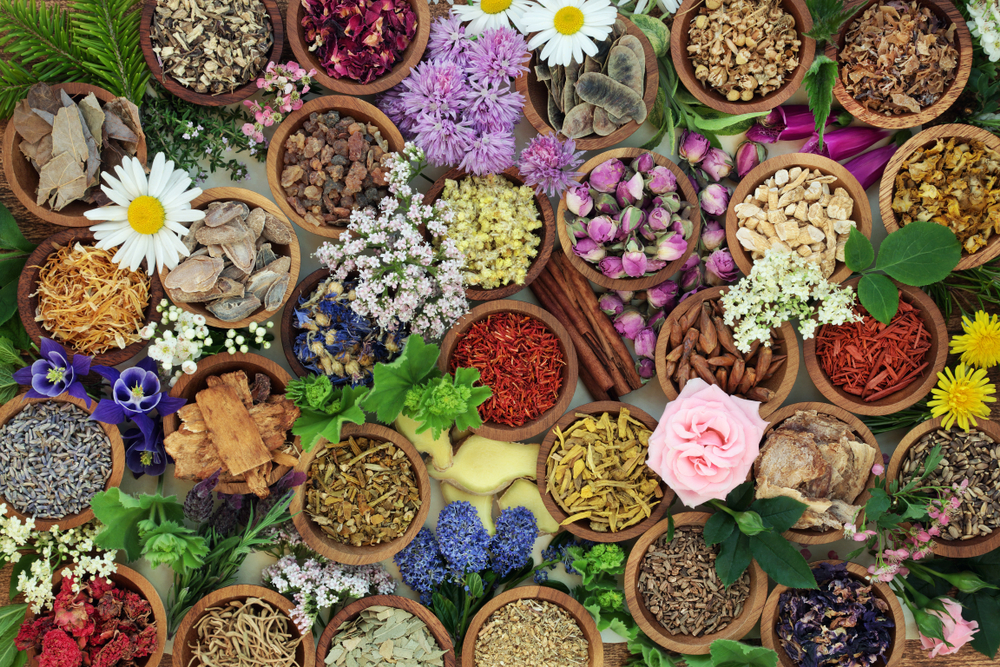That little orange prescription bottle in your medicine cabinet represents thousands of dollars in pharmaceutical research. But what if similar relief was growing in your garden all along? Throughout human history, people relied on plants for healing before synthetic medications existed. Now science is confirming what traditional healers have known for centuries—some herbs pack a pharmaceutical-grade punch.
The ancient anxiety remedy hiding in plain sight
When the walls feel like they’re closing in and your mind races faster than a caffeinated squirrel, you might reach for a prescription anti-anxiety medication. But there’s a humble herb that’s been calming frazzled nerves since ancient Greece.
Passionflower works in a surprisingly similar way to benzodiazepines like Xanax or Valium—it appears to increase levels of gamma-aminobutyric acid (GABA) in the brain, a neurotransmitter that reduces excitability in the nervous system. The result? A gentle wave of calm without feeling like you’ve been hit by a tranquilizer dart.
What makes passionflower particularly interesting is its gentle, progressive action. Rather than knocking you out, it takes the edge off while leaving your mental clarity intact. Some people find it helps quiet those middle-of-the-night thought spirals that turn a good night’s sleep into a distant memory.
Unlike its pharmaceutical cousins, passionflower doesn’t appear to cause physical dependence or daytime grogginess when used as directed. For mild to moderate anxiety, it offers a natural option worth exploring—though always talk with your doctor before swapping any prescriptions.
The pain reliever that doesn’t wreck your stomach
When inflammation has your joints screaming for mercy, nonsteroidal anti-inflammatory drugs (NSAIDs) like ibuprofen often come to the rescue. The downside? Long-term use can lead to stomach ulcers, kidney issues, and increased cardiovascular risks.
Enter turmeric, or more specifically its active compound curcumin. This vibrant yellow spice doesn’t just make curry delicious—it inhibits inflammatory enzymes in ways strikingly similar to NSAIDs. The difference is that turmeric actually protects the stomach lining rather than irritating it.
Multiple research comparisons have found turmeric extract performs similarly to diclofenac sodium (a prescription NSAID) for osteoarthritis pain, but with fewer side effects. The anti-inflammatory power of turmeric works more gradually than popping a pill—you won’t feel results immediately, but consistent use often leads to significant improvement without the digestive distress.
The catch? Turmeric is poorly absorbed on its own. To get medicinal benefits, you need either a supplement formulated with black pepper extract (which increases absorption by up to 2000%) or to consume it with fat and black pepper in food form. A daily golden milk latte might do more for your aching knees than you’d expect.
The mood lifter that doesn’t flatten your emotions
Depression affects millions, but many people struggle with the side effects of antidepressants—weight gain, sexual dysfunction, and emotional flatness can make treatment feel like a difficult trade-off.
Before Prozac existed, Europeans were prescribing St. John’s wort for “melancholia.” This sunny yellow flower contains multiple compounds that appear to increase levels of serotonin, dopamine, and norepinephrine—the same neurotransmitters targeted by many prescription antidepressants.
For mild to moderate depression, multiple analyses have found St. John’s wort works as effectively as selective serotonin reuptake inhibitors (SSRIs) with fewer side effects. Many users report it lifts mood without the emotional numbness sometimes experienced with pharmaceuticals.
However, there’s a major caution—St. John’s wort interacts with many medications by affecting liver enzymes that metabolize drugs. Birth control, blood thinners, transplant medications, and cancer treatments can all be affected. This isn’t a herb to self-prescribe if you’re taking other medications.
For those who are healthy, not pregnant, and not on other medications, this herb offers a scientifically-backed option for milder forms of depression, especially the kind that hits seasonally when sunlight is scarce.
The circulation booster that outperforms prescription options
Poor circulation plagues millions, particularly as we age. When blood flow slows down, everything from memory to sexual function can suffer. Pharmaceutical options like Viagra target specific symptoms but don’t address the underlying vascular health.
Ginkgo biloba, from the world’s oldest living tree species, increases blood flow throughout the entire body by making blood less sticky and dilating vessels. This comprehensive circulatory support explains why it improves so many seemingly unrelated issues—from erectile function to tinnitus to memory.
For cognitive performance specifically, research comparing ginkgo to ergoloid mesylates (a prescription drug for age-related cognitive decline) found similar effectiveness in improving attention and memory. The difference? Ginkgo improved overall blood flow to the brain, potentially providing broader benefits than the single-target medication.
The effects aren’t instant—ginkgo typically takes 4-6 weeks of consistent use before you’ll notice significant improvements. But for many, the wait is worth it for an herb that addresses the root cause rather than just masking symptoms.
The sleep inducer that leaves you refreshed, not hungover
Prescription sleeping pills come with a laundry list of concerning side effects—morning grogginess, amnesia, sleepwalking, and even dependency issues. For something we do every night, sleep shouldn’t require such problematic pharmaceutical assistance.
Valerian root has been used as a sleep aid since ancient Roman times, and modern research suggests it works on the same brain receptors as benzodiazepines, but with a gentler touch. Rather than knocking you unconscious, valerian helps ease the transition into natural sleep patterns.
What makes valerian particularly valuable is what doesn’t happen the next day—no “sleep medication hangover,” no amnesia effects, and no physical dependence. You wake feeling like you actually slept, rather than like you were chemically sedated.
The research is particularly promising for people who struggle with sleep latency—the time it takes to fall asleep. Studies show valerian can reduce this time significantly while improving subjective sleep quality. For those who lie awake with thoughts racing, this earthy-smelling root may offer relief without the pharmaceutical baggage.
Nature’s pharmacy requires respect
Before you clean out your medicine cabinet, a critical warning—”natural” doesn’t automatically mean safe for everyone. These herbs are pharmacologically active, which means they can interact with medications, may not be appropriate during pregnancy, and can cause their own side effects if misused.
The potency of herbal preparations also varies dramatically between brands and forms. A tea might offer gentle support while a concentrated extract could approach pharmaceutical strength. This variability means starting with the lowest effective dose and paying attention to how your body responds.
Perhaps most importantly, never discontinue prescription medications without medical supervision. These herbs may offer alternatives for some people in certain situations, but the transition requires professional guidance.
The middle path to healing
The most enlightened approach isn’t choosing between conventional medicine and herbal alternatives—it’s finding the right tool for your specific situation. Sometimes that’s a prescription, sometimes it’s an herb, and often it’s a thoughtful combination supervised by healthcare providers who respect both traditions.
For chronic, less severe conditions or preventative care, these herbs offer evidence-based options with potentially fewer side effects. For acute or severe medical issues, conventional medications often remain the appropriate first-line treatment.
The wisdom lies in recognizing these approaches as complementary rather than competing. After all, an estimated 25% of pharmaceutical drugs are derived from plants—the line between “natural” and “pharmaceutical” has always been blurrier than marketing would have us believe.
















